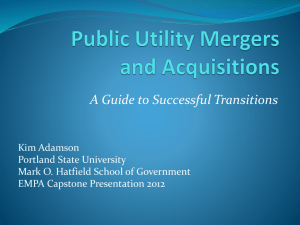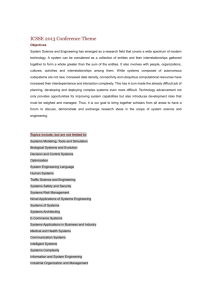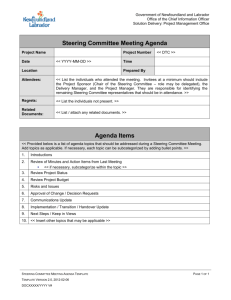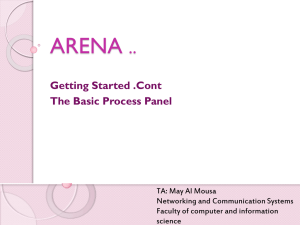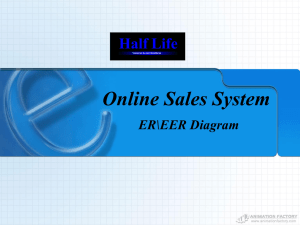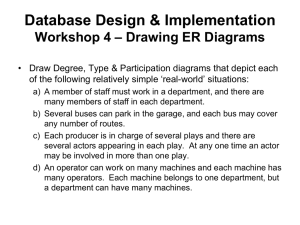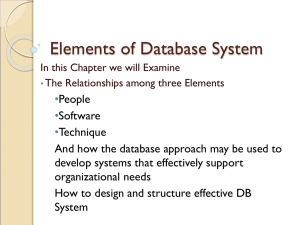Expenditure of Cochrane Collaboration core funds
advertisement
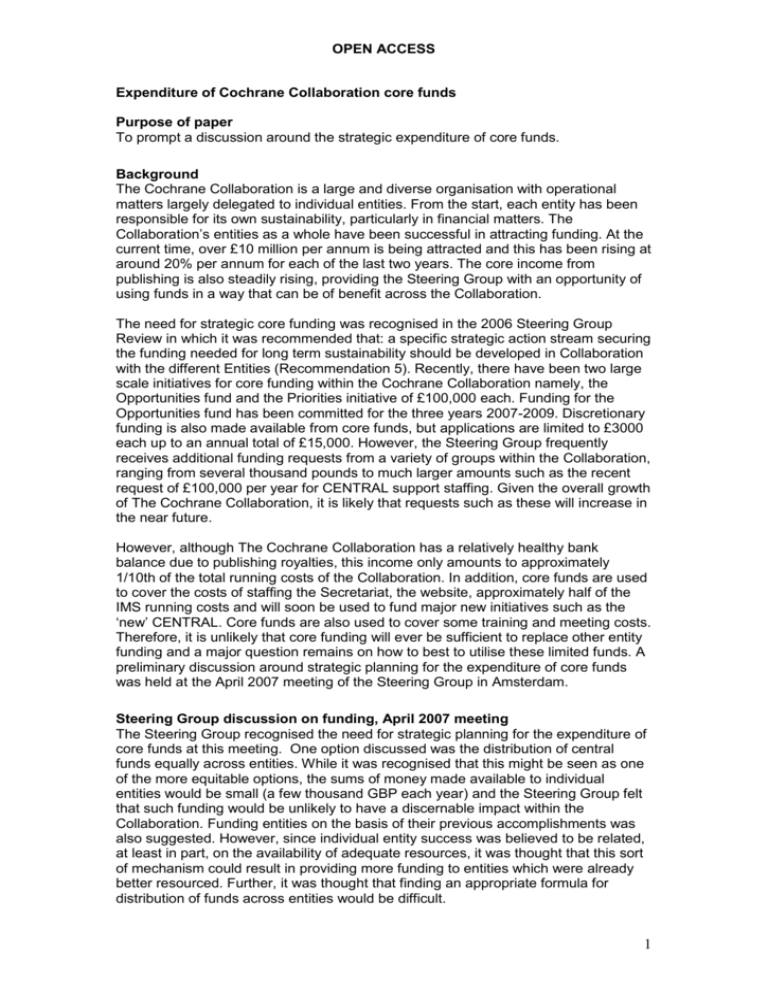
OPEN ACCESS Expenditure of Cochrane Collaboration core funds Purpose of paper To prompt a discussion around the strategic expenditure of core funds. Background The Cochrane Collaboration is a large and diverse organisation with operational matters largely delegated to individual entities. From the start, each entity has been responsible for its own sustainability, particularly in financial matters. The Collaboration’s entities as a whole have been successful in attracting funding. At the current time, over £10 million per annum is being attracted and this has been rising at around 20% per annum for each of the last two years. The core income from publishing is also steadily rising, providing the Steering Group with an opportunity of using funds in a way that can be of benefit across the Collaboration. The need for strategic core funding was recognised in the 2006 Steering Group Review in which it was recommended that: a specific strategic action stream securing the funding needed for long term sustainability should be developed in Collaboration with the different Entities (Recommendation 5). Recently, there have been two large scale initiatives for core funding within the Cochrane Collaboration namely, the Opportunities fund and the Priorities initiative of £100,000 each. Funding for the Opportunities fund has been committed for the three years 2007-2009. Discretionary funding is also made available from core funds, but applications are limited to £3000 each up to an annual total of £15,000. However, the Steering Group frequently receives additional funding requests from a variety of groups within the Collaboration, ranging from several thousand pounds to much larger amounts such as the recent request of £100,000 per year for CENTRAL support staffing. Given the overall growth of The Cochrane Collaboration, it is likely that requests such as these will increase in the near future. However, although The Cochrane Collaboration has a relatively healthy bank balance due to publishing royalties, this income only amounts to approximately 1/10th of the total running costs of the Collaboration. In addition, core funds are used to cover the costs of staffing the Secretariat, the website, approximately half of the IMS running costs and will soon be used to fund major new initiatives such as the ‘new’ CENTRAL. Core funds are also used to cover some training and meeting costs. Therefore, it is unlikely that core funding will ever be sufficient to replace other entity funding and a major question remains on how to best to utilise these limited funds. A preliminary discussion around strategic planning for the expenditure of core funds was held at the April 2007 meeting of the Steering Group in Amsterdam. Steering Group discussion on funding, April 2007 meeting The Steering Group recognised the need for strategic planning for the expenditure of core funds at this meeting. One option discussed was the distribution of central funds equally across entities. While it was recognised that this might be seen as one of the more equitable options, the sums of money made available to individual entities would be small (a few thousand GBP each year) and the Steering Group felt that such funding would be unlikely to have a discernable impact within the Collaboration. Funding entities on the basis of their previous accomplishments was also suggested. However, since individual entity success was believed to be related, at least in part, on the availability of adequate resources, it was thought that this sort of mechanism could result in providing more funding to entities which were already better resourced. Further, it was thought that finding an appropriate formula for distribution of funds across entities would be difficult. 1 OPEN ACCESS Using central funds in a way that supports multiple entities to do their core activities was seen as the best approach. In addition, it was likely that funders of Cochrane activities would view core funding as a positive return on their investment. This could include cross-entity infrastructure funding, or the provision of support for common activities that bring together members from different entities. It might also include funding the time of key individuals. Concerns were raised that the availability of central funding to support individuals could take away the volunteer nature of the Collaboration but it was also recognised that such an initiative could enhance the activities of the Collaboration’s volunteers. Therefore, it was agreed that a discussion paper on the expenditure of core funds would be prepared so that this could then be sent out across the Collaboration for broader consultation and feedback. Guiding principles The Steering Group recognised the need for the following guiding principles in regards to decision making on core funding: The Steering Group has a responsibility to allocate funds to the greatest benefit across the Collaboration. Resources should be concentrated on core activities related to the Strategic Plan. Funds should not be available from an alternative source. Decision-making should be strategic, transparent and accountable. Decision-making should be ‘enabling’ rather than ‘rewarding’. Decision making should support the identification of priority reviews, increase the number of new reviews on important topics, and continue the updating of existing reviews. Funding applications should build in performance measures so that the success of a funding exercise can be evaluated. Possible funding streams The Steering Group at the April 2007 meeting had a preliminary discussion about the possible funding streams. Some suggestions were: 1. Continuation of the Opportunities Fund. 2. Cochrane fellowships: buying the time of talented individuals to work on Cochrane related activities for a number of months. 3. A ‘commissioned’ approach, with the Steering Group working with ‘clusters’ across entities (e.g. TSCs) to generate work programmes to promote effectiveness and efficiency. 4. Open opportunities for people within entities to address priority issues in ways that the Steering Group had not previously thought of (i.e. similar to the new Opportunities Fund). 5. Cross-Collaboration support such as the current Colloquium-sponsored entity registration fees. 2 OPEN ACCESS Funding could come under the following four suggested categories: 1. Ongoing funding for Cochrane-wide infrastructure Suggested criteria and process for this category: Proposals would come to the full CCSG for discussion and decision, and be reported at AGM. Any proposal would be expected to include criteria against which success could be measured, a monitoring plan, and a timeline for a decision of whether funding should be continued, increased, decreased or discontinued Possibility that some Cochrane-wide infrastructure projects that were initially supported in part or wholly by entity funds may need increasing levels of central support over time SOP needed on how entities will apply for or recommend such funding Examples of new things we might fund under this category: Editor in Chief CENTRAL redesign New projects/communication position in secretariat New fundraiser positions in secretariat 2. Project funding based on highest strategic priorities Suggested criteria and process for this category: CCSG identifies a few priorities at each meeting and an overall budget for each. Priorities could arise from CCSG’s internal processes, from entities, or from external sources (e.g. the co-ed’s suggestion of an editorial board). Each to be addressed by either CCSG initiated or entity-initiated projects or by a combination of both. Process may vary depending on priority. Fairly open ended general call for proposals (here’s the goal – show us ways your entity could contribute to meeting it). Quite restricted general call for proposals (here are the detailed specs for what we need – respond if you’re able to meet them). Targeted request to one or a small group of entities (here are the detailed specs, we want the following individual(s) from your entity to participate). Announcement of priorities to all entities with invitation for proposals (if relevant). Examples of new things we might fund under this category: Rapid response team for priority reviews. Updating of reviews. Training for RevMan 5. Interim procedures for CENTRAL. 3. CCSG-initiated cross-Collaboration funding for specific entity costs For example, the current Colloquium-sponsored entity registration fees. 4. Ongoing process for consideration of ‘entity-initiated’ proposals Opportunities Fund and Discretionary Fund. 3 OPEN ACCESS Other discussion points Do we continue to accept unsolicited applications for funds? How are one-off core projects costed? Decision-making processes for each funding stream. How much do we continue to depend on volunteer contributions? Should entities continue to fund projects that contribute to infrastructure? How do we enable equitable access to core funding across the Collaboration? Donna Gillies Treasurer 3 September 2007 4
